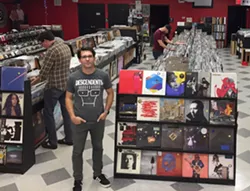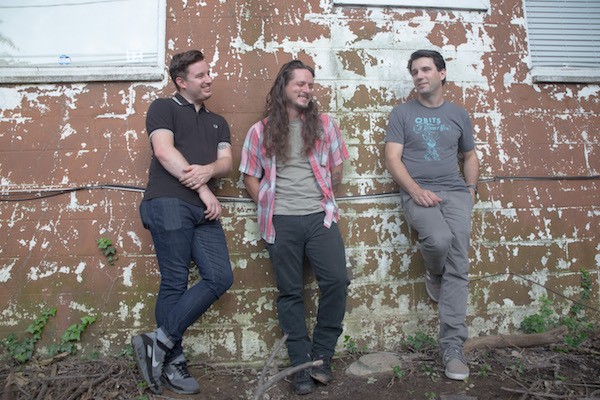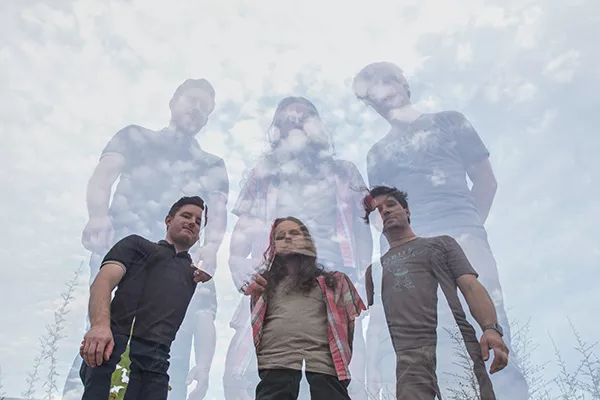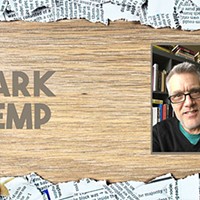When Scott Wishart decided to open a record shop in Plaza Midwood the day after Thanksgiving 12 years ago, he already had the name, the logo and the credibility. His older brother Steve had operated an indie label in Atlanta called Lunchbox Records, which put out music by several regional punk bands of the mid-'90s including a couple of LPs by Steve's own acclaimed early emo/math-rock outfit Car Vs. Driver.
"The record label had existed since 1990, but it was dormant by [2005] and I needed a name," Scott Wishart says. "I thought, 'Well, I already have a name and some identity and a tiny bit of recognition,' so I asked my brother and he said, 'Yeah, go ahead, use it.'"
The younger Wishart, now 42, sits on a stool at the back of the Charlotte version of Lunchbox Records next to a small stage where bands do in-store performances. It's just before opening time on a Thursday morning, and Wishart is wearing the requisite indie record store uniform: black-rimmed glasses, black Adidas Seeleys, gray jeans and a T-shirt emblazoned with the name Red Hare, a contemporary D.C. post-hardcore band on Dischord Records, the label of former Fugazi front man Ian MacKaye. The last time I saw Wishart, a few weeks earlier, he had on the same outfit but wore a different T-shirt: it had the logo of the '80s Southern California punk band Descendents.
Wishart isn't just the owner of this local record store; he's also the drummer of a local band, Late Bloomer, which recently opened for the Descendents and just wrapped up the recording of its third LP, tentatively titled Life is Weird, for the indie label 6131 Records. The new album will follow Late Bloomer's self-titled, self-released debut of 2013, and its second album, Things Change, which arrived the following year on the Rhode Island indie label Tor Johnson. On Tuesday, November 14, Late Bloomer will perform its earlier songs and some new ones at The Milestone on a bill with Virginia's Doll Baby and Batboy, and Charlotte's Minimums.
Wishart says he prefers to keep his day job separate from his night gig, although that's a pretty tall order given that both occupy the same little underground world of Charlotte music nerds.

- Wishart inside his shop on Descendents T-shirt Day. (Photo courtesy of Lunchbox)
"I don't tell my customers I'm in a band," Wishart says. "I mean, if somebody asks about it, I'll say something, but I don't just tell random people." He nods to the rows and rows of bins filled with vinyl records ranging from a used copy of an old LP by math-rock pioneers Don Caballero to a brand-new box set of early singles from the old-school hip-hop label Tuff City. "This is my job," he says, "and [the band] is my hobby, and I don't want one to influence the other."
When a customer came in a few weeks ago and noticed Wishart's Descendents shirt, he didn't acknowledge that his band had just opened for the group at the Fillmore. "They said, 'Oh, were you at that show?' And I'm like, 'Yeah, I saw it. Good show,'" he says. "I mean, I'm not going to be like, 'Yeah, I played it,' and sound like a douchebag."
His modesty fits his low-key personality. Wishart has played in noisy, adventurous punk bands since he was a teenaged skate rat growing up in Atlanta with three older brothers, notably Steve, who introduced the young Scott to punk rock. His move from bikes to skateboards to drums was seamless. "I got my first drums in the late '80s; I was probably 14 or 15," he says. "I'd already been to a couple of shows with my brother."
Wishart was in a number of bands in Atlanta including Ostinato and Scout, which often opened for Car Vs. Driver. He also landed a job working for the regional Manifest Records chain, which is what brought him to Charlotte in 2002. Upon arriving here, Wishart managed the local Manifest store on South Boulevard and also kept playing music, including stints in the free-jazz ensemble Tenspeed, with saxophonist Brent Bagwell and violinist/cellist Ben Kennedy, and the rock and punk bands Horse Thief and Planet Piss. Along the way Wishart got married, had a kid, and then, in the midst of a divorce in 2012, found himself with more time on his hands and energy that needed to be channeled into something constructive.
Enter Josh Robbins and Neil Mauney, who at the time were playing bass and guitar, respectively, as part of the local country-rock outfit Pullman Strike. The two were looking to form a new group that was more in the vein of early post-punk bands like Husker Du and Fugazi, and they approached Wishart.
"Ever since I moved to Charlotte in 2006, I told Scott I wanted to play in a band with him," says Robbins, who grew up in Wilmington. "It took us five years, but we finally did it."

- Robbins (from left), Mauney and Wishart of Late Bloomer. (Photo by Brian Twitty)
The timing couldn't have been more perfect for Wishart: "I was like, shit, I haven't got anything else to do. Better than sitting at home smashing the walls."
The three musicians began woodshedding, with Robbins and Mauney bringing in song ideas and Wishart helping to flesh them out. They recorded their first Late Bloomer record quickly and released it collaboratively on the Lunchbox Records label and Robbins' local indie Self Aware. It's a strong set of songs, several of which feature the tell-tale forward-lurching stomp of early-'90s post-punk. And there's lots of guttural bass lines, warbling wah-wah, sustained feedback and some ungodly drumming. (The importance of the band's powerful rhythm section of Wishart's jazz-like drumming and Robbins' crawling bass cannot be overstated.) As for the vocals: each member has an indie-rock thin voice that's capable of quickly exploding into wails over the slipshod melodies.
The songs on Things Change are more focused. Mauney's "Mirror" could be a lost '90s-grunge classic, a slow build to an onslaught of screamed vocals, killer riffs and layers of guitar notes that slash like knives and sizzle like bacon around Robbins' creeping bass lines and Wishart's clattering drums. But the foreboding "Dr. Abernathy" is the high point; Mauney's lyrics offer a snapshot of a confused kid who self-medicates with pot and gets unsolicited advice on how to deal with his emotional issues. It's set to spooky instrumentation that sonically erases the fuzzy line between medical doctors and street dealers.
"It's kind of about mental illness and addiction and how they often go hand in hand," Mauney explains. "And also how whenever someone has a mental illness or addiction, others want to chime in and say, 'Try this' or 'Try that,' and are so sure their method works. They want the ill person to meet their doctor, yet they don't know what it's like to be in that person's shoes."
Wishart's "Anesthesia" is a part-sung, part-spoken existential crisis set to an almost funky mix of swinging drums, crawling bass and simple guitar riffs; and Robbins' "Use Your Words" finds the bassist singing of feeling tongue-tied and insecure over a tangled mess of Huskers-like post-punk.
By all accounts, Wishart is the band member best equipped to take the nuggets Mauney and Robbins bring in and arrange them into interesting compositions. "Scott's head just isn't glued on like everyone else's," Robbins says. "I feel like I'm very black-and-white and 4/4 about everything, and he — for lack of a better way [to say it] — has a jazz sensibility about him in everything he does, especially when it comes to songwriting."
Mauney agrees: "Scott always finds some weirdo way to change things up."
Wishart's suggestions sometimes drive the two crazy. "Like [he'll say], 'Maybe this isn't a straightforward rock song that you just brought to us,'" Robbins says. "'Maybe I'll slow it down and play on the 3 instead of the 4.'" Robbins often feels like James Hetfield in the Metallica documentary Some Kind of Monster. "I wanna just scream, 'Play a regular rock beat!," he says. "But nine times out of 10, Scott is right and it makes the song so much better."
Wishart sees this as his job in the band. "I don't really write songs or play guitar, so I help with the arrangements," he says. Having worked in record shops for so long, and being a full decade older than the other two — Mauney is 30; Robbins, 31 — Wishart has more context for what works. He laughs. "I guess the context I bring is just having listened to so many bad records," he says. "You learn things from every record you listen to — what to do and what not to do — and you recognize certain things.
"Also, I'm into the weirder stuff, the more discordant things," Wishart adds, then pauses. "I don't want to say prog-y, because we're definitely not a prog-y band at all; I guess I mean the more math-rock-type stuff: odd time signatures and things like that. Not all of the time, but I like to throw those things in sometimes to make things interesting."
He cites the '90s band Jawbox — "especially their last album, the one on the major label," Wishart says. "If you just take the basic bass parts and the vocals on that album, everything is super melodic, but then the music behind it is much more complex. But you don't notice that it's complex. To me, that makes it less boring."

- Robbins (from left), Mauney and Wishart are cloud somethings. (Photo by Brian Twitty)
The members of Late Bloomer say they've reached new heights on the upcoming new album in terms of songwriting and playing. For one thing, it's been three years since the group released a full LP, so they had more material in their coffers to choose from. For another, they got some great input from 6131, which has put out stellar albums by such critical darlings as Touché Amoré and Culture Abuse, both now on Epitaph Records, and singer-songwriter Julien Baker, who just signed to Matador Records.
What's more, the producer of Late Bloomer's new album, Justin Pizzoferrato, has worked with numerous legends of indie rock including Dinosaur Jr.; Thurston Moore of Sonic Youth; Body/Head, the experimental guitar duo of SY's Kim Gordon and Bill Nace; and the more recent NYC band Parquet Courts.
"My goal for this record," Wishart says, "was for us to have 20 songs to pick from, so we could edit it down to the best stuff. We got to 17, demoed 14 of them and then, with help from the label, sort of whittled it down to the 10 that are on the record. So it's more consistent" — he laughs — "and there are no songs with me singing on this one."
"It's been a huge learning curve," Robbins adds, "and 6131 has been really patient with us." Robbins says he grew up "worshipping at the altar" of bands on the '80s indie labels SST and Dischord (Black Flag, Husker Du, Minor Threat, Fugazi), as well as later alt-country acts like Uncle Tupelo. He picked up the bass having been inspired by Lou Barlow of Dinosaur Jr. and Sebadoh, Kim Deal of the Pixies and Breeders, Laura Balance of Durham's Superchunk, among others. Since arriving in Charlotte to study English at UNCC, Robbins has played in numerous local bands aside from Pullman Strike, including Obstruction, Meth Mountain and Alright, with wife Sarah Blumenthal Robbins.
Getting outside suggestions on Late Bloomer's music was not something Robbins was accustomed to, and at first he found it "off-putting," he says. "But you have to act like it's a new member of the band — like, how would we react if we had one more band mate?"
For Mauney, who was born in Gastonia, raised in Fort Mill, South Carolina, and studied journalism at nearby Winthrop University, the experience was refreshing. "It was kind of cool having someone outside our band putting time and effort into us," he says.
Although Mauney's guitar work in Late Bloomer is very adventurous, his influences are more mainstream than those of his fellow Bloomers. "Kevin Cadogan from the first Third Eye Blind record played a huge role in my early guitar playing," Mauney says. "Scott and Josh make fun of me for that, but his playing and tone on that record are perfect." Mauney also draws from Hendrix, Malcolm and Angus Young of AC/DC, and even the late Jeff Buckley, in terms of his rhythm playing. "The way he would use chords to carry a melody always blew my mind," Mauney says of Buckley.
To Wishart, Mauney is Late Bloomer's secret weapon. "He can break out into all kinds of weird sounds and overdubs and solos, which can be both a blessing and a curse," Wishart says. He laughs. "Sometimes at practice he'll be like, 'I don't want to play this live, because it's not ready yet.' And we're like, 'We've been playing that song for years, just play it.' Even after we've recorded a song, he'll do that. And I'm like, 'Dude, it's recorded. Just play it like you did on the record. It doesn't have to be perfect. It's a solo! Just improvise a solo.'"

- Robbins (from left), Mauney and Wishart get lost in the trees. (Photo by Brian Twitty)
While Late Bloomer's sound may harken back to alternative rock's pre-standardized, early-'90s heyday, the mix of diverse influences among the band members, and the nuance Wishart brings to the arrangements, make the music feel refreshingly contemporary. Maybe the real secret weapon is the daunting library of records that surrounds the drummer every day. After all, Lunchbox is well-known for its quality selection of used albums the owner cherry-picks from the stacks of vinyl records he receives from sellers unloading their old music collections week after week.
I ask if Wishart thinks his owning a record store makes people expect higher standards from the band. He just laughs.
"In some ways I think we may be held to lower standards," he says. "I've had people imply things like, 'Oh, you just get these shows because you work in a record store.' Well, sure, that helps. Having this store has made me more aware of promoting things. And Josh having his own record label and PR company — that helps, too." He pauses. "But maybe getting those gigs just shows we're serious about stuff. If you don't do anything to promote your music, you're not going to get shows. Those things are a factor when somebody's booking your band."
Or when a hot indie label like 6131 comes knocking at your rehearsal-room door, offering a producer who's worked with critically acclaimed artists making similarly serious music that's a cut above the pack. That's what Late Bloomer is in Charlotte — a cut above the Plaza Midwood pack — and life is now getting much weirder for them.
Watch the video for Late Bloomer's "Dr. Abernathy."



